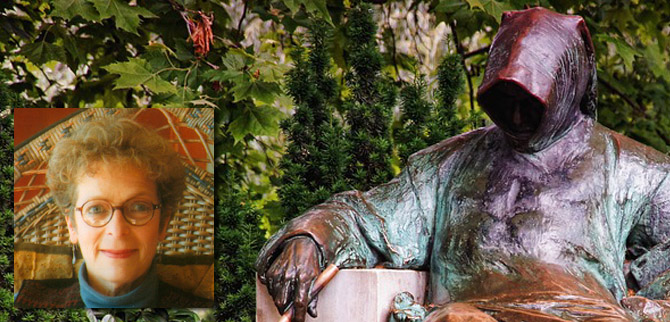When I think of Budapest, poems by Susan Varga
Susan Varga was born in Hungary in 1943. As a five-year-old she migrated to Australia. She has a MA in English Literature and a Bachelor of Laws. She has worked as casual teacher, in film, video and radio and, briefly, as a lawyer. Her first book, Heddy and Me, won the Christina Stead Award for non-fiction, followed by the award-winning novel Happy Families. Then she published Broometime, co-authored with her partner Anne Coombs. Her most recent novel, Headlong, was short-listed for the Barbara Jefferies Award. Rupture, her first book of poetry, was commended for the Anne Elder Award and was nominated in the ABR’s Best Books of the Year in 2016. Susan has been a periodic activist; with the women’s refuge movement, in land rights education around Mabo, and was co-founder of Rural Australians for Refugees. She is currently working on a new book, which will mix both poetry and prose.
When I think of Budapest
I think of 1990.
The Iron Curtain just lifted,
the city’s heart and limbs
still numb.
I think of the flat we rented
in the former Jewish quarter –
two sparse rooms with folding doors,
a crude kitchen with a cold water tap.
Outside our courtyard door
a creaking billboard in praise of false teeth
(grinning black mouth, big yellow molars)
swings above passers-bye.
On the square, a tiny restaurant serving
Hungarian-Jewish food.
All the customers knew the pretty waitress;
thirty years of cheery smiles,
the same open-toed waitress boots.
By the till, the owner
in a short white coat, doctor-like.
He doesn’t talk much
but his sad eyes took everything in –
the kids fighting in the square,
mothers and shoppers resting
under plane trees. The old ghetto
survivors at ease in the shade.
In 1944 the ghetto was sealed
off from the city. There was
nowhere to bury the dead.
The square was crammed
with Jewish bodies rotting
in ever higher rows
waiting for the day of judgement
for liberation.
Nearby is the Central Synagogue,
almost empty, its congregation
wiped out by Eichmann’s brilliant plan
to clear Budapest of all its Jews.
Just before Eichmann finished his task
Hitler recalled him to Berlin.
So a few remaining Jews
got to live.
In 1990 the congregation is sparse.
A few tourists. But one Saturday
a shy huddle of teenage girls approach
in their Sabbath best.
By the doors, boys lounge in wait,
as Jewish boys do, the world over.
When I think of Budapest
I see heavy tall doors
opening to courtyards,
cast-iron railings girding balconies
from floor to floor.
I hear the clatter of children,
past and present.
Mother knocks on the door
of her childhood home.
A worn-looking woman answers.
They are about same age, but Mother
glows like a film star beside her.
‘I’ve lived alone here alone
since the War,’ the woman says
‘My husband didn’t come back.’
Mother nods.
All Jews know what that phrase means.
She leads us into the kitchen.
There’s rows of bottled pears
and peppers on a shelf.
‘For the winter,’ the woman says.
Mother nods again,
‘We used to do the same.’
They fall to talking
about food.
Mother at the Flat
Mother comes to visit from her posh hotel
bringing pocaga filched from its big breakfast,
She stands at the front door, beaming
showing off her prize –
‘I never thought I would visit you
here in Pest!’
We are walking through her past.
Yesterday she took me to see
her old girl’s school where Jew
and Gentile mixed as one.
(But only a lucky few were
invited to the Christian girls’
birthday ‘jours’)
Tomorrow, we will knock at the door of
my father’s bachelor flat
where he read his books
and waited for a wife to appear.
Years passed –
the neighbours had given up hope.
In a coffee house he met my mother
fresh-faced, 21, deep blue eyes, olive skin.
Lively, frank.
Later he told her,
‘You were the only woman there
who did not make herself up.’
2.
Seven years later, the night I was born,
my father wept for joy. An hour later
he left for forced labour in the north.
When I was six months old,
he was granted a day’s leave.
A Christian friend lent them a flat,
risking the favour.
At dawn he kissed her
and left, his awkward body
helpless in its ill-fitting uniform.
She watched for a last glimpse
of him before he vanished
in the early morning crowd.
She knew.
© Susan Varga


